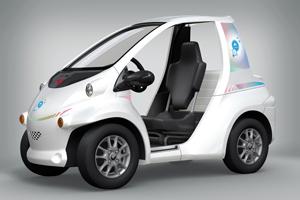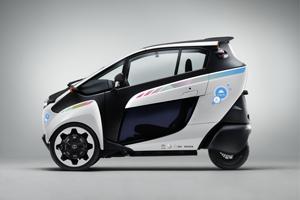Grenoble, “Smart City” from October with 'Citélib by Ha:mo', an Innovative 100% Electric Car-Sharing Scheme Connected to Public Transport
Grenoble, France, July 1, 2014 /3BL Media/ – You hear a lot about future mobility, smart cities, and other innovations designed to make cities and urban transport more pleasant and manageable in years to come. Concrete examples, however, are still few and far between. When the back-to-school season begins after this summer, this dream will become a reality in Grenoble and the outlying area, making the French Alps city a pioneer in future mobility.
In October 2014, 70 Toyota i-ROAD and COMS ultra-compact electric vehicles, and around 30 charging stations developed and managed by EDF’s subsidiary Sodetrel, will be open for service for a period of three years thanks to a unique partnership between the City and the Metropolitan Area of Grenoble, French energy company EDF, Japanese car maker Toyota and Citélib, a local car-sharing operator.
Connected to the public transport system’s IT infrastructure, this new car-sharing scheme will complement Citélib, the current car-sharing service of Grenoble, by allowing users to pick up one of the small EVs at one location and drop it off at another. The project also aims to promote interconnectivity of public transport methods (trams, buses, trains) and a new type of personal mobility using small vehicles that don’t take up as much space as a normal car. The main idea is to allow commuters to drive the first or last kilometres of their journey for increased flexibility and time-saving, thus contributing to reducing traffic congestion and improving air quality in city centres.
Citélib by Ha:mo responds to today’s challenges… and saves you time
Recent social trends and consumer behaviours make it clear that sustainable mobility is here to stay. The only question is how fast this market will develop.
Surveys show that the average daily commute in Europe takes between 40 and 50 minutes. Increasingly, commuters use public transport, but most of them still have to walk a good 15 minutes to reach their final destination. New IT technologies, paired with innovative mobility solutions, are starting to allow the introduction of more flexibility to urban mobility, and will undoubtedly make up the cornerstone of future smart cities.
Just imagine: it’s Monday morning. You leave your apartment on the outskirts of Grenoble at 7:25 to go to work. Half asleep, you take the tram to the city centre―a 20-minute ride. You get off, and wait for the connecting bus for five minutes. Ten minutes later, the bus drops you off five minutes from your office. It’s 08:05. You’re late, again, for the 8:00 meeting and haven’t even had time for a coffee. Sometimes, for more flexibility, you take your car. You drive to the city but this means you must leave even earlier, at 7:15 – and that’s not a guarantee you’ll arrive on time, with traffic and the time it takes to find a parking spot. Sound familiar?
With Citélib by Ha:mo, say goodbye to stress and delays. During your tram ride, you whip out your smartphone. With an app, you can visualise the available i-ROADs at your usual stop. In a few clicks, you reserve and pay. Another app can also allow you to see the status of traffic and public transport before you leave, so you can plan the best route that day.
Once you get off the tram, all you have to do is flash your phone onto the charging station to release your i-ROAD. In six minutes, you ride to the charging station near your office, two minutes away. It’s 7:53 – plenty of time for a coffee before the 8:00 meeting. You just saved 30% of your commute time. Going somewhere else that morning? No problem. There are around 30 stations in Grenoble, a network tight enough to get you as close as possible to your destination.
A unique partnership with a common vision of tomorrow’s urban mobility
By bringing together their respective competencies, the project partners are offering Grenoble an innovative service which will allow a real-life, thorough evaluation of the potential of this new form of mobility. “The Grenoble-Alpes Métropole community has always been open to innovation,” explains Christophe Ferrari, President of the Grenoble-Alpes Métropole. “In terms of scale, it’s perfectly suited to this kind of test, and in Grenoble, we have a tradition of daring to do things. The partnership itself, between us, Toyota, EDF and Citélib, a local car-sharing operator, is in and of itself also an innovation in France,” he added. “It’s a great opportunity for our community to test, for three years and exclusively in Europe, a new mode of mobility that’s not only innovative but also economic and ecological It's an experimentation that is bound to be followed by others for the benefit of our citizens.”
The scale of this integrated and complex project means it’s impossible to realize alone: partnerships and collaboration are key to its success – between the project partners of course, but also with the local communities.




